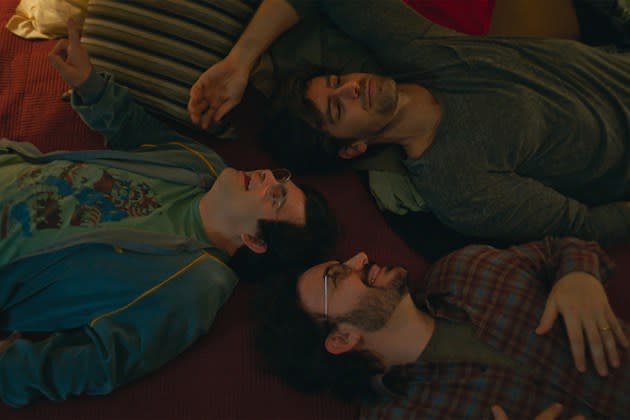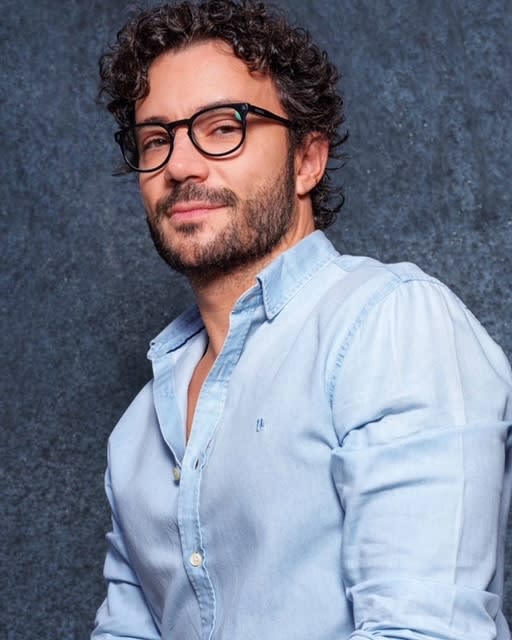Director Rafael Primot on ‘Black Rain’ and the Evolution of Brazilian Story Telling with The Creators Bridge (EXCLUSIVE)
- Oops!Something went wrong.Please try again later.
- Oops!Something went wrong.Please try again later.
- Oops!Something went wrong.Please try again later.

In a pivotal move underscoring the international appeal of Brazilian narratives, Rafael Primot’s “Black Rain” is set for an exclusive global launch through The Creators Bridge.
The series, which delves into contemporary themes such as unconventional families, fraternal love and diversity, does so with a mature and nuanced lens.
More from Variety
In the storyline, brothers Zeca (Marcos Pitombo) and Vitor (Rafael Primot) are entrusted with the care of their younger brother Lucas (João Simões), a 16-year-old with Down Syndrome, following the mysterious disappearance of their parents, Nancy (Julia Lemmertz) and Geraldo (Zé Carlos Machado).
Their journey is enriched by the support of characters like Julie (Vanessa Giácomo), Vitor’s wife; Micha (Leona Jhovs), a trans woman, and Aunt Yara (Denise Del Vecchio). Throughout the series, the intricate tale of Nancy and Geraldo unfolds through evocative flashbacks, offering viewers a deeper understanding of the family’s history.
The Creators Bridge, a boutique creative content agency, is the driving force behind this international venture. Founded by industry veteran Felipe Herz Boclin, the agency stands out for its innovative approach to curating and promoting Brazilian creative assets on the global stage. “Brazil, given its audience/viewers market size on subscription and media power, has a unique opportunity to attract international capital for production and also export valuable assets,” Bowline remarked.
At its core, The Creators Bridge operates as a creative-commercial nexus, adeptly navigating the vast audiovisual landscape. It specialises in identifying and marketing valuable Brazilian assets across the production spectrum, from original scripts by award-winning screenwriters to international co-productions. This holistic approach, combined with the expertise of former Globo executives, positions them as a bridge between creative studios and business, fostering collaborations that resonate both domestically and internationally.
Brazil’s audiovisual landscape is undergoing a transformative phase, evolving beyond its traditional stronghold in telenovelas.
“What we are witnessing is a new wave of talent with fresh storytelling references. Streaming platforms are driving a new pace of production, narrative styles, and genres. If the Brazilian audiovisual industry has to develop itself ten years in two, this is the right moment,” Boclin observed. He further emphasised the global influence shaping Brazilian content, noting the impact of diverse international productions from the Nordics to Chile. This global integration is pushing Brazilian creatives beyond the traditional melodrama school, heralding a “New Brazilian Drama wave all over the world.”
Despite past governmental setbacks and challenges faced by independent producers, the industry is blossoming. Agencies like The Creators Bridge stand as not just participants but catalysts in this evolution, championing narratives like “Black Rai” and underscoring Brazil’s burgeoning role in the global entertainment tapestry.
Variety interviewed Primot as his series launches into the global market.
Over the last few years, Brazilian telenovelas have showcased more naturalistic performances. How does Black Rain”[“Chuva Negra”] embrace this trend, and what opportunities does it offer actors in their portrayals?
“Chuva Negra” was crafted with a clear intention to mirror the complexities of real life. We wanted viewers to recognise themselves in the characters, to see their own perfections and imperfections reflected on screen.
The series delves into themes that might be considered delicate by some, but at their core, they’re fundamentally human, emerging from the tragedies and triumphs that life throws at us. Our narrative approach, the writing, and the performances all converge to treat these themes with empathy and generosity. We aimed to humanise every character, to showcase the naturalness of their experiences. The story unfolds, revealing that even the most traditional families have their secrets, their dark sides.
As the narrative progresses, we see that everyone, regardless of their background, has flaws. On a broader scale, the acting style in Brazil has been undergoing a transformation. Influences from modern cinema, international series, and even the raw authenticity of reality shows have reshaped expectations. Today’s audiences demand genuine portrayals; they want to immerse themselves in a story without being constantly reminded that they’re watching fiction.

The visual language of “Chuva Negra” is notably cinematic, more paused and observant. Can you discuss this choice and its influence on the narrative?
“Chuva Negra” is a series that, while addressing global themes and pressing social issues, primarily zeroes in on love, affection, and the intricacies of family dynamics. With the intent of discussing differences and promoting inclusion, I opted for a classic narrative style. This was juxtaposed with the more fantastical element of the dark, muddy rain, symbolizing impending transformations.
The cinematography was chosen to mirror the varying emotional climates of the characters. When they come together, there’s warmth, but each character also grapples with their own internal storms. The visual style was a deliberate choice to enhance the storytelling, making it resonate with audiences on a deeper level.
Working with João Simões, an actor with Down syndrome, must have presented unique challenges. How did you adapt your approach to ensure his outstanding performance?
João Simões is an extremely dedicated actor who loves what he does. I met him in the theater, in a small amateur group in which he participated alongside other actors with special characteristics. To ensure he could deliver the best performance and for his well-being, we had a few months of preparation and rehearsal just with him, alongside Rodrigo Frampton, my assistant who helped João both memorise his lines and understand them, which was, in my view, the main point of the preparation.
We scheduled quality time on set for his scenes, which was not always possible in a low-budget production like ours. We also talked to and prepared the entire team to welcome our actor. But, as I said, João is very dedicated and talented; he arrived on set with absolutely all scenes rehearsed and was always willing to redo a take when necessary.
I believe in the importance of always creating a conducive environment to welcome the actors so that the set space is a creative, light-hearted place among professionals, enabling us to perform scenes in the best possible way. This was done, and we also spoke with all the technicians about having a trans actress in the cast and about the gay sex scenes. I did not want any untasteful or outdated comment to happen backstage; this fight is for life, it is not just a speech on screens or in front of cameras.
It is necessary to make the filming environment as inclusive and loving as possible. And my producer, Daniel Gaggini, ensured this, where macho, prejudiced, or untasteful comments or attitudes would not be allowed, and we also demanded a team full of diversity – our little ideal world.
The series uses a mixed timeline structure to add depth to a specific narrative arc. Can you share the thought process behind this choice?
The dramaturgy was meticulously developed with a focus on the transformation arc of the characters. The rain, which emerges right in the first episode, signals the imminent changes. The characters, throughout the plot, are compelled to evolve, confronting their pains and internal demons, ensuring that their journeys do not end as they began.
My inspiration to address deep human issues is inspired by the vision of filmmakers like Ingmar Bergman, whose works often explore the complexity and vulnerability of the human being in an incredibly authentic and intimate way with a touch of fantastic realism. During the 20 years in which I have been writing plays and scripts, I have always seen human issues as the core of the narrative. I do not seek to impact through grandiose sequences that only demonstrate technical skill, but through delicate and honest details that explore the gaze, the breath, and the essence of the characters, their conflicts, social disconnections, pains, and intricate loves.
These are the stories I want to tell. I want to talk about these lives, these dilemmas, surrounding social problems, and about the constant human evolution that life instigates at every moment. Human beings, with all their fragilities and complexities, fascinates me, and it is about this that I want to write and speak: about the fragile and the human, whether these lives are extraordinary or ordinary, for they all have their own interesting essence.
Best of Variety
Sign up for Variety’s Newsletter. For the latest news, follow us on Facebook, Twitter, and Instagram.
